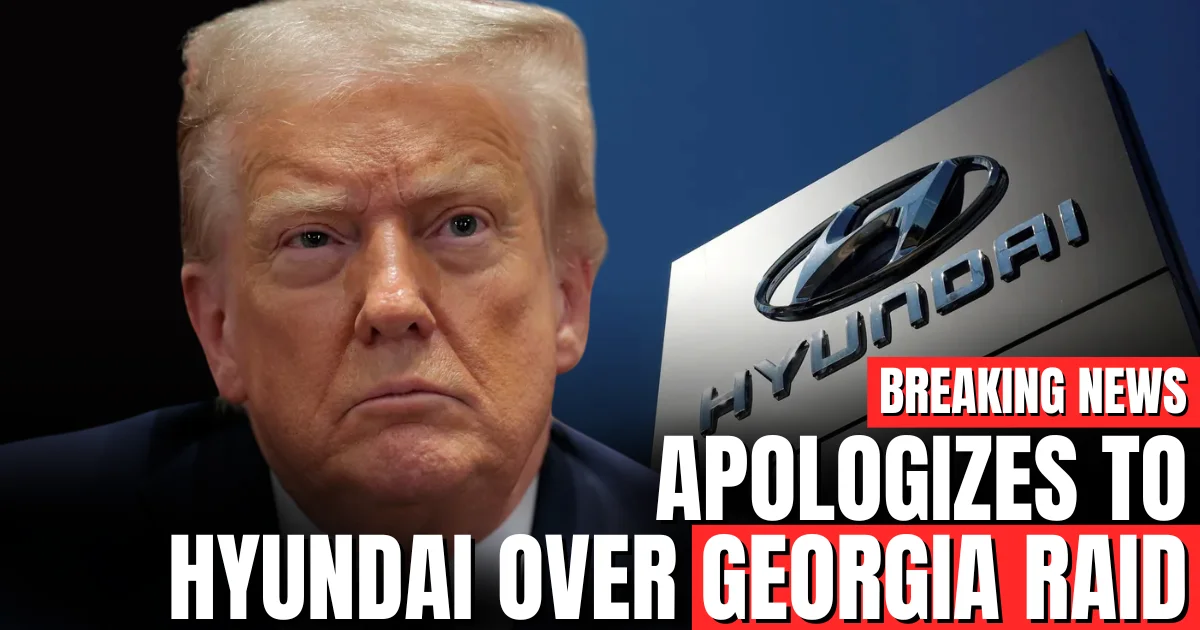White House issues apology to Hyundai following Georgia facility raid, says company CEO. Business and diplomatic implications of the incident analyzed.
Table of Contents
White House Issues Apology to Hyundai Over Georgia Facility Raid, Confirms CEO
The White House has formally apologized to Hyundai Motor Company following a federal law enforcement raid on the automotive giant’s Georgia manufacturing facilities, according to the company’s chief executive. The unprecedented apology resolves what Hyundai leadership described as a significant misunderstanding with serious business implications.
The incident raises questions about federal investigative procedures involving foreign corporations operating in the United States. The apology represents an unusual acknowledgment of government overreach affecting international business relations and investment confidence.
What Happened During the Georgia Raid
Federal agents conducted an enforcement operation at Hyundai’s substantial Georgia manufacturing complex, disrupting normal business operations and creating alarm among company leadership. The raid involved multiple agencies executing what authorities initially characterized as a legitimate investigative action.
Hyundai operates major production facilities in Georgia employing thousands of workers and representing billions in capital investment. The automotive manufacturer’s Georgia operations produce vehicles for American and export markets while supporting extensive supply chain networks.
Raid details according to company statements:
Federal agents arrived unannounced during regular business hours, presenting warrants and beginning immediate facility searches. Production operations halted temporarily as investigators examined documents, computer systems, and manufacturing areas.
Employees faced questioning and facility access restrictions during the multi-hour operation. Management cooperation occurred under legal counsel guidance as company officials sought clarification about investigation objectives.
Media coverage of federal presence at the facility created immediate public relations challenges. Images of law enforcement vehicles at the plant generated concerns among investors, customers, and South Korean government officials.
Initial lack of clarity:
Hyundai representatives reported difficulty obtaining specific information about investigation targets or alleged violations. This ambiguity complicated corporate response strategies and heightened anxiety about potential legal exposure.
Federal officials provided limited explanations during the raid, citing ongoing investigation confidentiality. Company attorneys struggled to assess legal risks or formulate appropriate defensive strategies without clear understanding of allegations.
The White House Apology
Following high-level discussions between Hyundai executives, South Korean diplomatic officials, and American government representatives, the White House issued a formal apology acknowledging the incident’s problematic aspects.
Apology key elements:
The White House expressed regret for disruptions to Hyundai’s legitimate business operations. Officials acknowledged that investigative actions occurred based on flawed information or procedural mistakes.
American authorities emphasized continued commitment to welcoming foreign investment and protecting corporate operations’ integrity. The apology attempted to reassure both Hyundai specifically and international business community broadly.
Assurances were provided regarding review of procedures to prevent similar incidents affecting law-abiding corporations. The government committed to improving coordination and verification before executing enforcement actions at major facilities.
Hyundai CEO’s public statement:
The chief executive confirmed receiving the White House apology through appropriate diplomatic and business channels. He characterized the resolution as satisfactory while noting the incident’s disruptive impact.
Company leadership expressed appreciation for swift government response addressing their concerns. The CEO emphasized Hyundai’s commitment to continued American investment and operations despite the unfortunate incident.
Officials noted that productive dialogue occurred at senior levels demonstrating the importance of the US-South Korea economic partnership. The resolution preserves relationships crucial to ongoing business activities and expansion plans.
Business and Economic Implications
The incident and subsequent apology carry significant implications for foreign companies operating in America and broader international investment confidence.
Corporate concerns raised:
Major multinational corporations rely on operational stability and legal predictability when making billion-dollar investment decisions. Unexpected federal raids create uncertainty that can influence future capital allocation choices.
Hyundai’s Georgia facilities represent substantial economic commitments based partially on expectations about regulatory environment and government relations. Incidents undermining those expectations affect investment return calculations and risk assessments.
Impact on Georgia’s economy:
Hyundai’s Georgia operations generate thousands of direct jobs and support extensive supplier networks throughout the region. Any disruption threatening these operations carries serious economic consequences for local communities.
State officials work aggressively to attract and retain major manufacturers like Hyundai. Federal actions creating problems for key employers complicate state economic development efforts and relationships with corporate partners.
Georgia’s automotive sector depends on reputation as business-friendly environment. Incidents suggesting federal overreach or investigative mistakes potentially damage that reputation when companies evaluate expansion or location decisions.
US-South Korea Relations Context
The Hyundai incident occurred within the broader framework of strong US-South Korean economic and security partnerships. The prompt apology reflects recognition of relationship importance.
Bilateral economic ties:
South Korean companies represent major investors in American manufacturing, technology, and other sectors. Hyundai, Kia, Samsung, and LG operate substantial US facilities employing tens of thousands of Americans.
Trade between the nations exceeds hundreds of billions annually. The US-Korea Free Trade Agreement facilitates commerce supporting jobs and economic growth in both countries.
Technology cooperation, particularly in semiconductors and automotive innovation, creates strategic partnership dimensions beyond traditional trade. Both nations share interests in supply chain resilience and advanced manufacturing.
Diplomatic considerations:
The South Korean government closely monitors treatment of its major corporate citizens operating internationally. Incidents affecting companies like Hyundai receive attention at highest diplomatic levels.
Embassy officials and economic ministers engage when Korean companies face significant challenges in foreign jurisdictions. The Hyundai raid likely triggered immediate diplomatic communications seeking explanations and resolutions.
American foreign policy prioritizes strong alliances with democratic Asian nations as geopolitical counterweights. Economic relationship health with South Korea carries security and strategic importance beyond purely commercial considerations.
Precedent and Accountability Questions
The White House apology to a major corporation following a federal raid represents an unusual acknowledgment with potential precedent implications.
Rare government admission:
Federal agencies typically defend investigative actions even when criticism emerges. Formal apologies to corporations for enforcement operations are extraordinarily uncommon.
The admission suggests that internal reviews identified significant procedural failures or information errors justifying exceptional response. Standard government practice involves defending agencies absent clear wrongdoing.
Questions about oversight:
The incident raises concerns about verification procedures before executing enforcement actions at major facilities. What safeguards exist to prevent raids based on faulty information or inadequate evidence?
Congressional oversight committees might examine the circumstances producing this situation. Legislators representing affected communities and business interests typically demand explanations for disruptive federal actions later deemed mistaken.
Corporate advocates may call for enhanced procedural protections and verification requirements before executing enforcement actions at law-abiding major employers. Balancing enforcement needs with business stability presents ongoing policy challenges.
Legal and Compliance Perspectives
For corporations, the incident highlights importance of compliance programs and crisis response capabilities when facing unexpected government actions.
Corporate preparedness lessons:
Even companies operating lawfully can face federal investigations based on mistakes, misunderstandings, or third-party allegations. Preparation for potential enforcement actions represents prudent risk management.
Legal counsel specializing in federal investigations provides crucial guidance when agents arrive with warrants. Immediate access to experienced attorneys helps protect corporate interests while ensuring appropriate cooperation.
Crisis communication strategies become essential when federal presence at facilities generates media attention. Managing stakeholder concerns—employees, investors, customers, community members—requires sophisticated response capabilities.
Government investigation realities:
Federal agencies possess broad investigative authorities justified by legitimate enforcement needs. Corporations cannot prevent all investigation possibilities regardless of compliance efforts.
However, the Hyundai situation demonstrates that even powerful federal agencies make mistakes requiring correction. Companies should not assume that government actions are automatically justified or beyond challenge.
Diplomatic channels and high-level relationships can prove valuable when corporations face problematic government actions. Hyundai’s ability to engage through South Korean government connections facilitated swift resolution.
Impact on Foreign Investment Climate
International business leaders monitor how governments treat foreign corporations when making investment decisions affecting job creation and economic development.
Investment confidence factors:
Regulatory predictability and fair treatment influence whether companies commit capital to particular jurisdictions. Unexpected enforcement actions perceived as unjustified create uncertainty affecting investment attractiveness.
The swift White House apology may mitigate potential damage to America’s foreign investment reputation. The response demonstrates accountability and relationship priority that reassures international business community.
Competing for investment:
American states and regions compete globally for manufacturing facilities and corporate operations. Incidents suggesting federal overreach or investigation problems can disadvantage US locations versus alternatives in other countries.
Economic development officials emphasize stable regulatory environments and cooperative government relationships when courting corporate investment. Stories about federal raids later deemed mistaken undermine those marketing messages.
What Happens Next
Hyundai indicated that operations returned to normal following the incident’s resolution. The company expressed commitment to continued American investment despite the disruption.
Ongoing considerations:
Internal government reviews likely continue examining what produced the problematic raid. Accountability measures and procedural improvements may result from lessons learned.
Hyundai will presumably evaluate whether enhanced government relations or additional protections are warranted. The incident provides experience informing future crisis response preparations.
Congressional oversight might produce hearings or investigations if legislators deem circumstances warrant examination. Federal investigative procedures affecting major employers interest multiple constituencies.
FAQ SECTION
1. Why did the White House apologize to Hyundai?
The White House issued a formal apology acknowledging that federal law enforcement actions at Hyundai’s Georgia facilities were based on flawed information or procedural mistakes. The apology recognized disruptions to legitimate business operations and aimed to preserve the important US-South Korea economic partnership. This rare government admission reflects the incident’s seriousness and potential impact on foreign investment confidence.
2. What was the Georgia raid about?
Federal agents conducted an enforcement operation at Hyundai’s substantial Georgia manufacturing complex, executing warrants and searching facilities, documents, and computer systems. Initial details about investigation objectives remained unclear to company officials. The White House apology suggests the raid occurred based on faulty information or inadequate verification, though specific circumstances have not been publicly detailed.
3. How does this affect Hyundai’s US operations?
Hyundai’s CEO confirmed that operations returned to normal following the incident’s resolution and expressed continued commitment to American investment. The swift White House apology and diplomatic resolution appear to have preserved the relationship. However, the incident likely prompted internal reviews of crisis response procedures and government relations strategies to handle potential future situations.
4. Is it common for the White House to apologize to corporations?
No, formal White House apologies to major corporations following federal enforcement actions are extraordinarily rare. Federal agencies typically defend investigative actions even amid criticism. The unusual acknowledgment suggests internal reviews identified significant procedural failures justifying exceptional response, reflecting both the mistake’s seriousness and the US-South Korea relationship’s strategic importance.
5. What does this mean for foreign companies investing in America?
The incident raises questions about regulatory predictability and investigative procedures affecting foreign corporations. However, the swift apology demonstrates government accountability and relationship prioritization that may reassure international investors. The episode highlights the importance of crisis preparedness, strong legal counsel, and diplomatic relationships for foreign companies operating in the United States.
CONCLUSION
The White House apology to Hyundai following the Georgia facility raid represents an unusual acknowledgment of federal investigative missteps with significant business and diplomatic implications. The swift resolution through high-level engagement demonstrates the importance of US-South Korean economic partnerships and foreign investment relationships.
For corporations operating internationally, the incident underscores the value of crisis preparedness, experienced legal counsel, and strong diplomatic relationships when facing unexpected government actions. Even law-abiding companies can encounter federal investigations based on mistakes or faulty information requiring sophisticated response capabilities.
The episode raises important questions about verification procedures before executing enforcement actions at major facilities and balancing legitimate investigative needs with protecting business operations. As global competition for foreign investment intensifies, maintaining reputation for fair treatment and regulatory predictability remains crucial for American economic competitiveness.
Should the government implement stronger safeguards before raiding major employers? How can America balance enforcement needs with protecting foreign investment confidence? Share your perspective in the comments!

